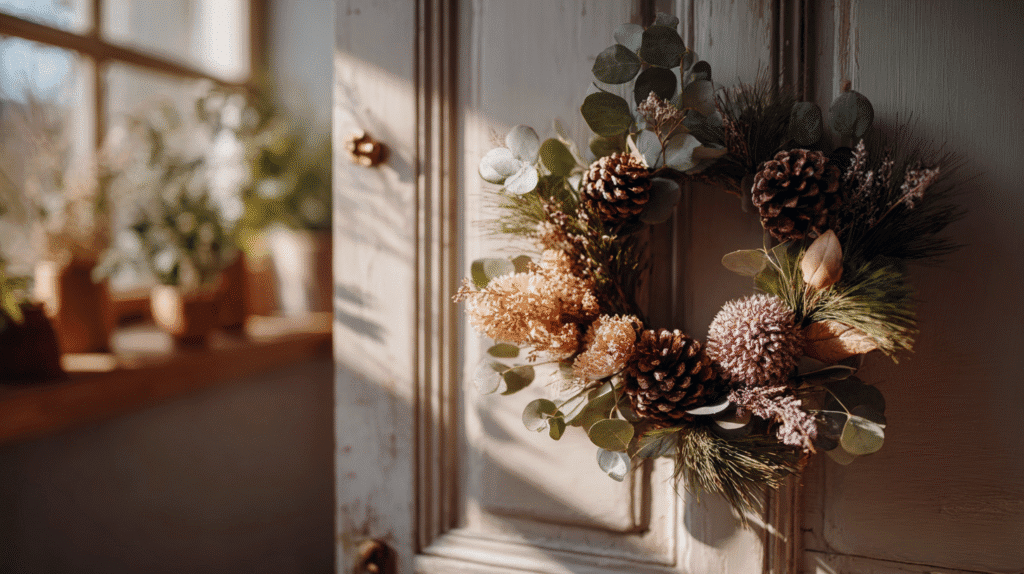This post may contain affiliate links, including those from Amazon Associates. If you make a purchase through these links, I may earn a commission at no additional cost to you. Learn more about our affiliate policy.
Somewhere between the crisp morning air and the rustle of leaves underfoot, fall invites us to bring a bit of the season home.
One of my favorite ways to do this is by creating a simple wreath for the front door. There’s something grounding about working with natural materials, gathering pinecones from a forest bathing walk, drying flowers from the summer garden, or choosing eucalyptus for its calming scent.
A natural wreath welcomes you each time you step through the door, reminding you of the beauty in simplicity.
This season, I’ve gathered seven natural and beginner-friendly wreath ideas. Each one uses materials you can find on a walk, at a local market, or tucked away from last season’s garden.
The process is as soothing as the final result, and it’s easier than you might think.

Why Choose Natural Wreaths
In a world where synthetic decor is often the default, turning to nature feels restorative. Natural wreaths connect us to the rhythm of the season, reminding us of abundance, cycles, and impermanence.
They’re also affordable, completely unique and eco-friendly rustic decor projects. No two foraged leaves or pinecones are alike, which means your wreath will always carry its own quiet signature.
The beauty of DIY natural wreaths lies in their imperfection like branches that bend in their own way, grasses that sway with their own curves, berries that vary in size and shade.
These details add texture, depth, and authenticity to your front door. And when the season passes, most of these wreaths can be composted, returned to the earth with gratitude.
How to Create a Natural Wreath: The Basics
Before we dive into specific ideas, it helps to know a few simple steps that apply to almost every wreath project. These basics will carry you through no matter what materials you choose:
- Choose a base – Grapevine, straw, foam, or even an embroidery hoop can serve as your foundation. Grapevine bases are the most versatile and forgiving.
- Gather and prepare materials – Forage, clip, or purchase natural items. If you bring home pinecones or acorns, bake them at a low heat to remove insects. Dry flowers by hanging them upside down for a week.
- Layer from large to small – Start with your biggest or most textural materials first, then add smaller accents.
- Secure as you go – Use floral wire, hot glue, or twine. Wire works best for stems, while glue is ideal for pinecones, fruit, or flowers without stems.
- Step back often – Hang your wreath on a hook while working so you can see the shape from a distance. Adjust balance as you go.
- Finish with a ribbon or detail – Adding a bow, ribbon, or even a sprig of herbs at the end creates polish and makes the wreath easy to hang.
With this rhythm in mind, the projects below will feel approachable and creative, so choose the projects that speak to you and your decor.
1. Foraged Foliage and Pinecone Wreath
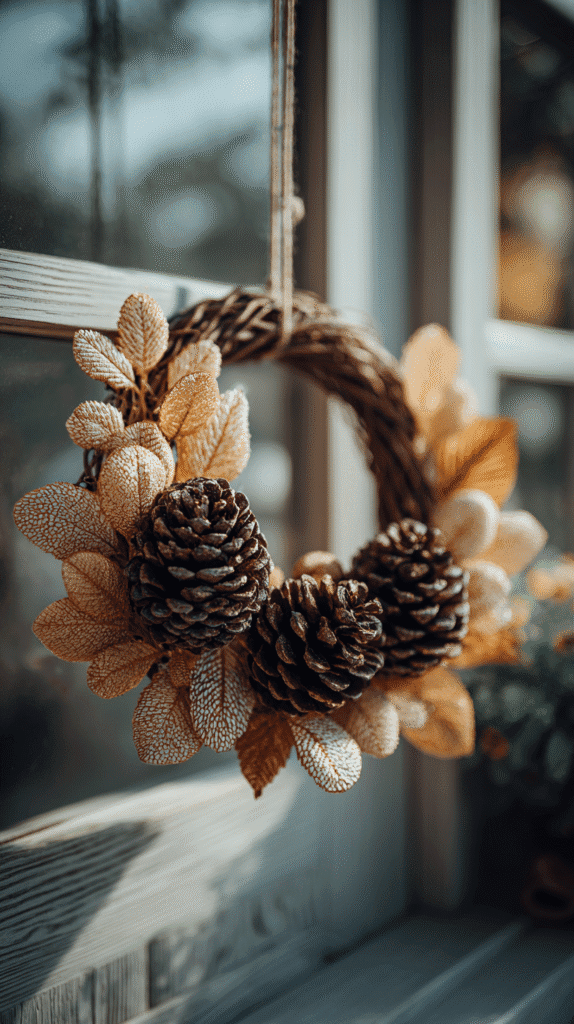
You’ll need: grapevine or twig wreath base, pinecones, colorful autumn leaves, floral wire or hot glue
Steps:
- Attach pinecones around one side of the wreath, clustering or spreading them depending on your style.
- Tuck in autumn leaves so they peek out naturally between the pinecones.
- Secure everything with floral wire or hot glue.
- Keep layering until the wreath feels full and textured.
Styling tip: Add sprigs of dried hydrangea or seed pods for extra dimension and a rustic touch.
2. Corn Husk and Dried Grasses Wreath
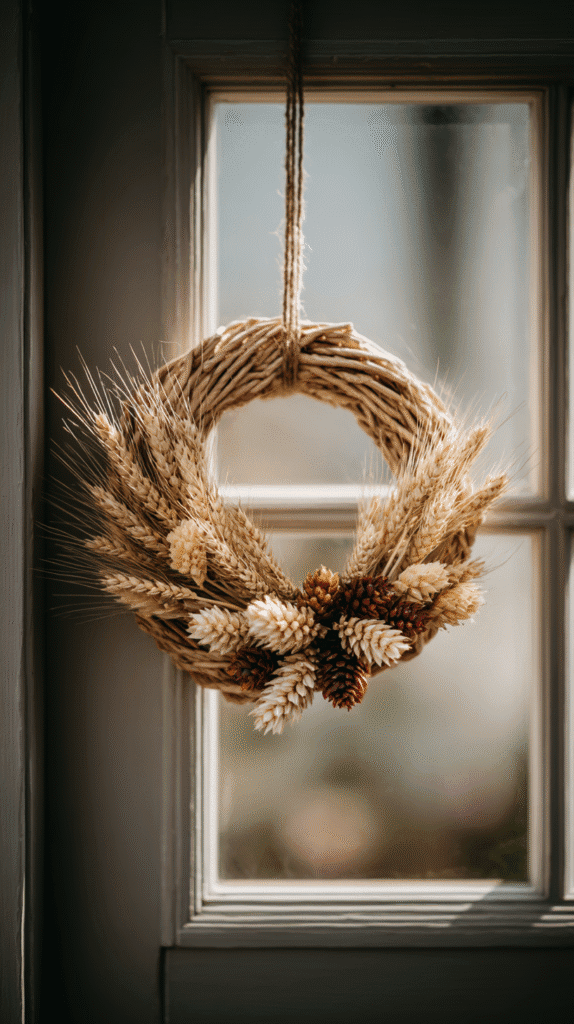
You’ll need: straw or twig wreath base, dried corn husks, wheat stalks or pampas grass, hot glue or wire
Steps:
- Cut corn husks into long strips if they’re thick.
- Layer husks around the wreath form, fanning outward to create volume.
- Add stalks of dried wheat or grasses, tucking them between husks for softness.
- Secure with wire or glue until evenly covered.
Styling tip: Stick to neutral cream and golden tones for a modern rustic palette.
3. Dried Flower and Hydrangea Wreath
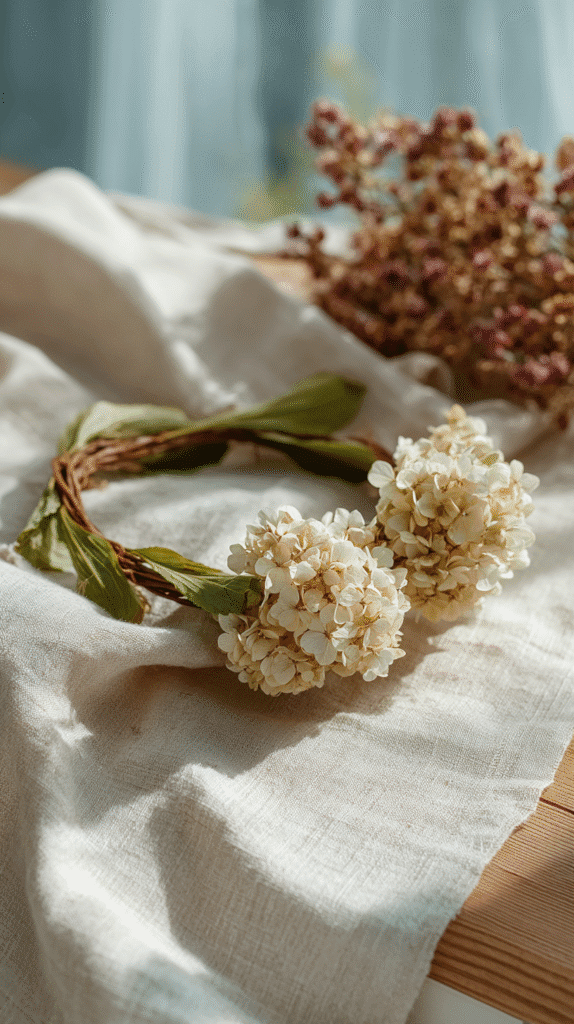
You’ll need: grapevine base, dried hydrangeas, smaller dried florals, hot glue
Steps:
- Cluster hydrangea blooms at the bottom half or one side of the wreath.
- Fill in gaps with smaller dried flowers like yarrow or baby’s breath.
- Secure with glue, adjusting angles for a natural flow.
- Step back often to make sure the shape feels balanced.
Styling tip: Keep blooms in one color palette—such as creams or greens—for an elegant, monochrome look.
4. Simple Pinecone Accent Wreath
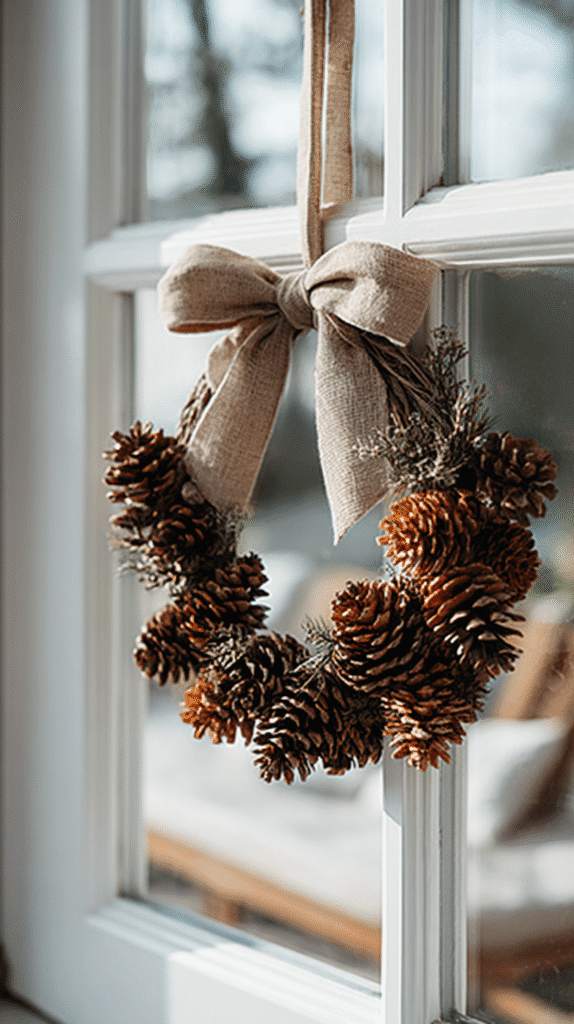
You’ll need: foam or grapevine base, pinecones, ribbon, hot glue
Steps:
- Arrange pinecones in a circle or cluster, depending on the style you like.
- Hot glue them firmly to the wreath form.
- Add smaller cones or acorns in gaps for texture.
- Tie a wide ribbon at the top for hanging.
Styling tip: Use a ribbon in rich fall tones like maroon, mustard, or taupe to make it pop.
5. Minimalist Eucalyptus Hoop Wreath
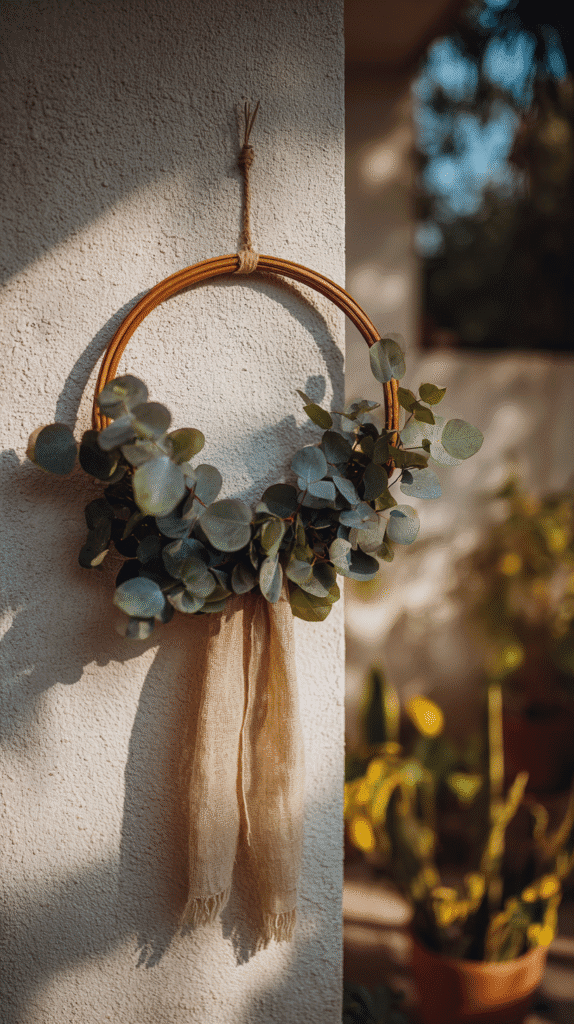
You’ll need: embroidery hoop, eucalyptus stems (fresh or dried), floral wire, ribbon
Steps:
- Place eucalyptus stems along the bottom half of the hoop.
- Wrap floral wire around stems to secure.
- Let some leaves extend slightly off the hoop for an organic flow.
- Attach ribbon at the top for hanging.
Styling tip: Leave the top half bare for a modern, minimalist look.
6. Leaf Garland Wire Wreath
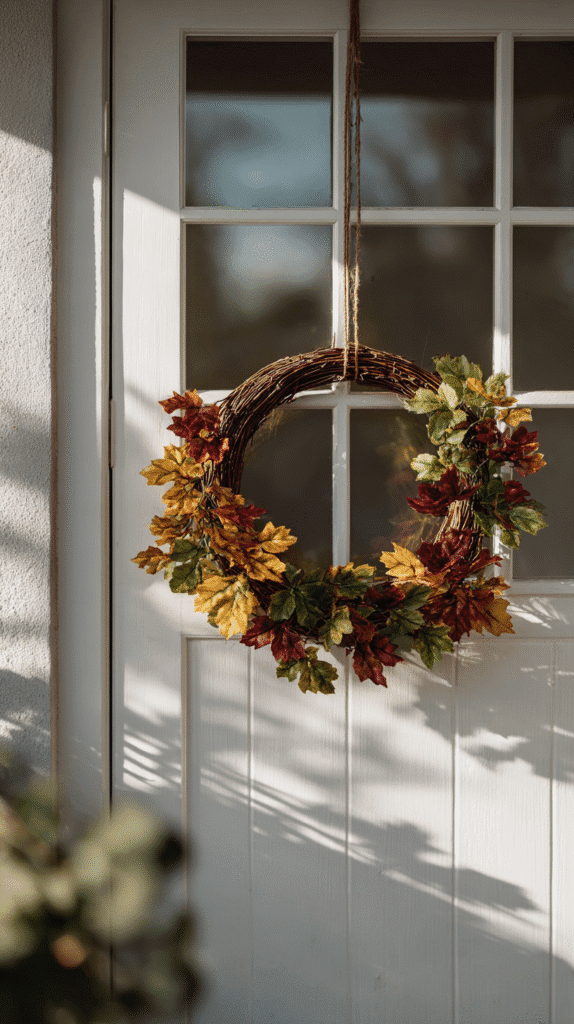
You’ll need: wire wreath frame, dried colorful leaves, thread or thin wire
Steps:
- Thread leaves by their stems or midribs onto the wire.
- Wrap the wire around the frame, layering leaves in a circle.
- Mix different leaf types for variation.
- Adjust so colors flow evenly around the wreath.
Styling tip: Arrange leaves in a gradient (yellow to orange to red) for a striking ombré effect.
7. Fruit and Berry Harvest Wreath
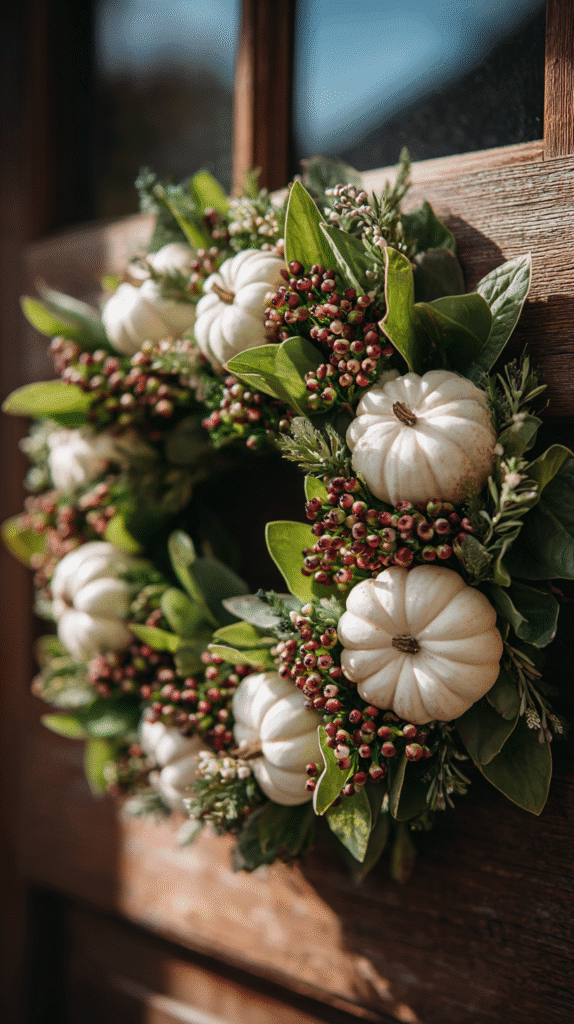
You’ll need: twig or grapevine base, small dried or faux pumpkins, berries, hot glue
Steps:
- Cluster fruit and berries in groups of three or five.
- Hot glue clusters around the wreath, leaving some bare twig visible.
- Add herbs or greenery for fragrance and balance.
- Check symmetry by holding the wreath at arm’s length.
Styling tip: Use muted tones like ivory pumpkins or faded orange berries for a modern, understated harvest look.
Closing Thoughts
There’s a quiet kind of joy in crafting with what nature offers. A wreath is more than decoration—it’s a way of marking the season, slowing down, and celebrating beauty in everyday details. When you take the time to create with your hands, you’re also creating a moment of calm for your nervous system, a pause in the busyness of life.
Whether you choose dried hydrangeas, eucalyptus, or a handful of gathered leaves, your front door becomes a gentle invitation: come in, slow down, and breathe in the season.

